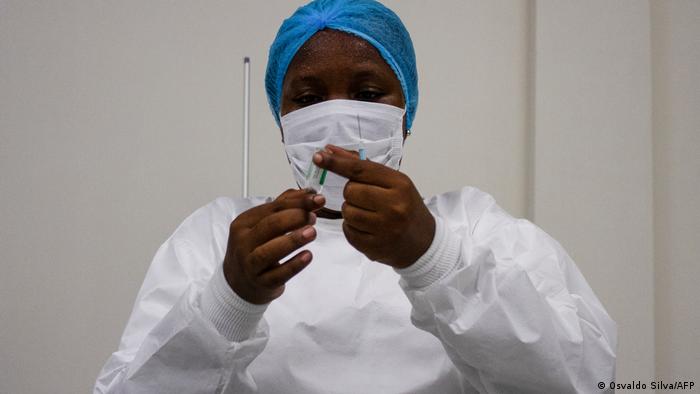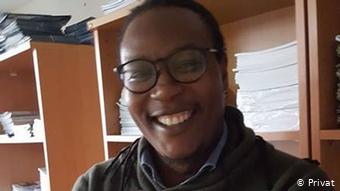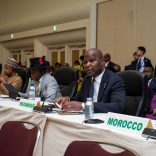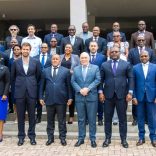Mozambique: President wants coal, magnetite transported to Maputo port by rail
Covid-19: Mozambique will have to continue “to fight with the weapons it has”

Photo: DW
- Mozambique has registered the highest increase in Covid-19 cases in Africa in the last two weeks, a study shows. Researcher Jorge Matine says that “it is difficult for Africans to help themselves” without outside support.
A study by the Tony Blair Institute, published this Tuesday (06.07), shows that Mozambique had the highest growth in Covid-19 cases in the last two weeks in Africa, registering an increase of 172%.
This Tuesday (July 6), the country registered another 11 deaths and 1,458 new cases, mostly in the city and province of Maputo.
Despite the growing number of infections, Jorge Matine, a doctor and researcher at the non-governmental organisation Observatório dos Cidadãos para a Saúde, does not doubt that Mozambique is now “better prepared” than it was a year ago, when it faced the first wave of the pandemic.
Also read: COVID-19: Worst day so far for Mozambique
Study warns of exponential growth of cases and deaths in Mozambique – AFP
Jorge Matine also noted that the Mozambican government “has abundantly replicated all the measures announced by the World Health Organization” (WHO) across the country – from confinement to closing trade and mandatory teleworking. “So, what other types of measures could still be implemented?” he asks.
Even so, he considers that the implementation of the measures in the country has not always been successful, due in part to social problems and to proximity to South Africa.
Counting vaccines donated by China, India, Portugal and the international Covax mechanism, 981,000 doses have arrived in Mozambique since the beginning of the pandemic. To these can be added another 500,000 vaccines purchased by the private sector for its workers, 139,000 of which were offered to the Ministry of Health.
Mozambique will have to continue “fighting with the weapons it has”, Matine says. “The little that is coming has already made it possible to vaccinate the people in the front line. Now, if the others [other countries] continue to keep their vaccines, it will be difficult to eliminate this pandemic.”
DW Africa: The Mozambican government has already confirmed that Mozambique is facing the third wave of the pandemic. Is the country now better able to face a new wave than a year ago?
Jorge Matine (JM): I think Mozambique is better prepared today to face, at least without major problems, this third wave than it was a year ago, when the first wave of the pandemic began.
DW Africa: In several countries around the world, the fight against new variants and waves is being carried out with mass vaccination, which is not the case in Mozambique and Africa in general. Having said that, what should be the government’s strategy to avoid a new, more serious outbreak?
JM: At this moment – and this is the message that has been a hallmark of the government since the beginning – is that all the measures announced by the WHO have been abundantly replicated in all areas of the country. There was a direct communication from President Filipe Nyusi to Mozambicans about the seriousness of the pandemic. Given the country’s poverty, which affects a large part of our population, Mozambique has not been able to successfully implement these types of measures. Also note that the situation is worst in large urban centres.

DW Africa: How can this reality be changed? Should more restrictions be imposed?
JM: This is a bit difficult. When I was younger, we used to say, “Let’s play outside!” With the arrival of the pandemic, this discourse changed. The Government is aware that it is necessary to change habits, and this is being done by the Mozambican Government, by the health authorities and also by the police authorities. And at this point, I ask, what other types of measures could still be applied? Closing shops, curfews, forcing people to be confined, telework – everything has been tried. It is true that we have not been very lucky, as neighbouring countries are greatly affected by the pandemic. South Africa was the first country here in southern Africa to be hit by the Delta variant.
DW Africa: Is Mozambique able to identify the Delta variant or is it continuing to send the tests to South Africa?
JM: It’s still sending the tests to South Africa.
DW Africa: WHO recently said that oxygen demand in Africa could be a problem in this third wave. Do you think Mozambique is also at risk?
JM: Knowing the Mozambican reality and also looking at the difficulties of the African economy, neighbouring countries and others, only South Africa would be in a position to successfully face a situation of lack of oxygen. We have to fight with the weapons we have, because if the West – especially the European Union and the United States of America – does not share what it has, it will be difficult for Africans to help themselves. If others continue to keep vaccines themselves, it will not be possible to eliminate this pandemic. It will take us many more years.












Leave a Reply
Be the First to Comment!
You must be logged in to post a comment.
You must be logged in to post a comment.